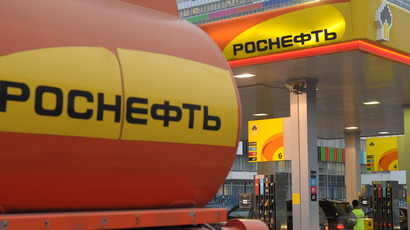China to become Russia's biggest oil client

The desire for Russia and China to boost trading ties is making China Russia’s priority market, as European demand for Russian oil decreases. Russian state-owned oil major Rosneft is tripling supplies to China to 1 million barrels a day.
China is increasingly becoming Russia’s priority market, with
Moscow looking to further boost ties, as European demand for
Russian oil decreases. Russian state-owned oil major Rosneft is
tripling supplies to China to 1 million barrels a day.
A package of energy deals have been signed in Moscow on Friday, as
the new Chinese leader Xi Jinping is visiting Russia to discuss
developing cooperation with President Vladimir Putin.
Rosneft agreed to increase exports to China by an additional 31
million tonnes over the next 25 years. The final documents binding
the exports of Russian oil will be signed soon, the company's head,
Igor Sechin said.
"We have agreed to gradually increase supplies from 800 thousand
additional tonnes to 31million tones," Sechin said, adding that
Chinese company Sinopec had offered to join the Sakhalin-3 project
and that negotiations on the matter may conclude soon.
The oil agreement may involve up to $30 billion in loans for
Rosneft, which needs the money to cover the purchase of
British-Russian TNK-BP for $55 billion, after closing the deal on
Thursday.
Russia has been steadily increasing its oil exports to Asia as
European oil and gas markets shrink due to the economic downturn.
Around 15% of Russian oil exports are heading east, thanks to the
new pipelines to China and to the Pacific coast.
In 2013 Russia plans to increase its oil supplies to China by 1
million tonnes via the Eastern Siberia–Pacific Ocean oil pipeline.
From 2015 to 2017 Rosneft reportedly plans to send 7 million tonnes
of oil to Asia by sea, according to Nezavisimaya Gazeta referring
to unnamed sources.
Rosneft wants to ship 7 million tonnes of oil to China through the
Pacific port of Kozmino in 2013 and increase it to 9 million tons
next year.
Earlier reports suggested that Rosneft planned to double its oil supplies to China and deliver part of it through Kazakhstan.
China is also looking to increase its natural gas imports. With
a new head of the People’s Republic it may now become easier for
the two nations to reach an agreement on natural gas pipelines
through Siberia, after six years of bargaining over prices. A
contract stipulating terms for Russian gas supply is expected to be
signed in June this year and a long-term contract will also be on
the agenda, head of Gazprom, Alexey Miller said.
If an agreement is reached Russia could supply up to 68 billion
cubic meters of gas a year to China through the new cross-Siberian
routes.
Russia's Gazprom may now need to give in to China’s price demands as rival Russian gas producers are also looking to serve China.
Bilateral trade between Russia and China has been “skyrocketing over the past few decades,” CCTV correspondent Tian Wei told RT. The China Institute of Contemporary International Relations forecasts that trade between Russia and China will exceed $100 billion in 2015.
“Fourteen times - that is the increase of the bilateral trade over the past 20 years. Many say this is a relationship that is not only strong politically, but also economically,” Tian Wei said.
“However, having said that though, there might be a lot of
space for improvement and further promotion of the bilateral
relations in terms of trade and economic ties. For example, some
suggest that the goal of $100 billion of bilateral trade by the
year 2015 can be reached earlier,” she added.
Next week Xi Jingping and Vladimir Putin will meet once again at
the BRICS summit in South Africa with the other emerging economies
of Brazil, India, and South Africa.
The leaders will discuss the proposed reserves pool, and India and South Africa's suggestion to create a joint development bank, which would fund emerging economies’ infrastructure projects.
“The BRICS countries need to establish effective mechanisms to get them to act together. So, the idea of establishing a common joint development bank, for better coordination among their official think tanks and so on will be useful,” Joseph Cheng, political analyst from Hong Kong City University told RT.
“There's a very strong common interest in the sense that all five members would like to seek a larger role in the international community. And they also understand that effective coordination within the BRICS group will help all of them to achieve this goal.”














